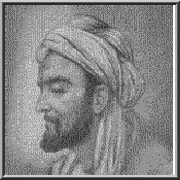 Avicenna
(Abu Ali Sina),
or Ibn Sina (980-1037). He was a Persian physician and philosopher.
He was born near Bukhara then capital of the Samanid dynasty. By the
time he was 10 years old he had learned the Koran as well as Arabic
grammar and literature. By the age of 16 he had mastered not only
natural science and rudimentary metaphysics but also medical theory.
He was not satisfied with merely a theoretical understanding of
medicine so he began to treat the sick. He knew enough about medicine
to treat the ailing Samanid ruler Nuh Ibn Mansur. The successful
treatment gained Avicenna access to the rich library of that
prince.
Avicenna
(Abu Ali Sina),
or Ibn Sina (980-1037). He was a Persian physician and philosopher.
He was born near Bukhara then capital of the Samanid dynasty. By the
time he was 10 years old he had learned the Koran as well as Arabic
grammar and literature. By the age of 16 he had mastered not only
natural science and rudimentary metaphysics but also medical theory.
He was not satisfied with merely a theoretical understanding of
medicine so he began to treat the sick. He knew enough about medicine
to treat the ailing Samanid ruler Nuh Ibn Mansur. The successful
treatment gained Avicenna access to the rich library of that
prince.
Abu Ali Sina was one of the main interpreters of Aristotle and was the author of almost 200 books on science, religion and philosophy. Avicenna's two most important works are: Shifa (The Book of Healing) and Al Qanun fi Tibb (The Canon of Medicine). The first is a philosophical encyclopedia based on Aristotelian tradition and the second is the most famous single book in the history of medicine. His medical system was long the standard in Europe and the Middle East.
Avicenna died in 1037 in Hamadan, Iran.
Designed by: Mina Comailian
References
Afnan, Soheil.(1958).Avicenna, His Life and Works. London: G. Allen &Unwin.
Goodman, Lenn Evan, (1992). Anicenna. London, New York: Routledge.
Lauren S. Bahr, Bernard Johnston, (1992). Collier's Encyclopedia.. New York: MacMillan, Inc.
Janssens, Jules L. (1991). An annotated bibliography of Ibn Sina . Belgium: Leuven University Press.
Online References